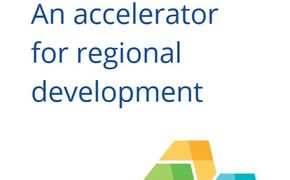The Policy Learning Platform organised an online matchmaking on 22 April, for the benefit of the Region of Western Macedonia in Greece and on the topic of resource and energy efficiency support schemes for SMEs.
The moderation and concept of this event are signed by Katharina Krell and Marco Citelli, Thematic Experts on environment and resource efficiency.
The key learnings and additional information can be found in the matchmaking report.
Objectives of the meeting
- To discuss with Interreg Europe peers options to design and deploy a new energy and resource efficiency support scheme for SMEs in the Region of Western Macedonia (Greece)
- To help them increase their competitiveness while also upgrading the environmental performance of their operations.
Peers from across Europe
Alongside our Thematic experts on environment and resource efficiency, brillant peers were invited and participated to the matchmaking:
- Sebastian Hummel, Department for technological innovation and resource efficient production at Ministry of Economics, Energy, Transport and Regional Development of Hessen (Germany)
- Charlotte Reith, Department for technological innovation and resource efficient production at Ministry of Economics, Energy, Transport and Regional Development of Hessen (Germany)
- Nawzad Mardan, University of Gävle, Gävleborg county (Sweden)
Some key takeaways
- Finding access to SMEs and attracting them towards support schemes is the critical starting point. This can be achieved through various mobilisation strategies such as targeted promotional campaigns and the establishment of dedicated SME efficiency networks as in Gävleborg.
- Showcasing success stories of companies that benefitted from support schemes in the past can be a good way for inspiring SME owners and for making funding opportunities known and overcoming investment barriers.
- Auditing is the enabling precondition to identify the energy and material saving potentials and to implement a rational set of measures to improve the building and process efficiency performance at SME level.
- Accompanying the audit with a networking and efficiency training approach with 3-4 meetings per year animated by an expert as in Gävleborg increases the chances that SMEs implement measures after an initial audit and build efficiency into all their processes.
- Offering funding solutions for the implementation of the savings measures identified in the audit as in PIUS Invest's combination of grants and soft loans increases the percentage of SMEs that follow-up the audit with an actual investment. The grant percentage may go up to 50% if process innovations are made.
- To maximise the impact of any regional support schemes for SMEs it is advisable to design them in a way that allows businesses to ultimately obtain both energy and resource efficiency gains since tackling the two issues at once brings with it a higher transformative potential
- ERDF resources can be successfully used for implementing energy and resource efficiency schemes targeted at SMEs in compliance with EU State aid rules, i.e. the de minimis Regulation.
- EU State aid rules in turn allow co-financing up to 50% of costs sustained by SMEs for improving their energy and resource efficiency as a form of permitted aid for process and organisational innovation in accordance with Article 29 of the General Block Exemption Regulation (GBER).
- There is no 'one fits all' solution for the assessment of SMEs investment projects and for determining their eligibility under energy and resource efficiency support schemes. Such an assessment needs to be carried out on a case-by-case basis by consulting bodies and banking institutions.
- While predetermined evaluation criteria are therefore of limited or no use, the relevant benchmark is to be found in the definition of 'process innovation' under GBER Article 2(97), which already provides an'exclusion list' of what is not eligible for State aid for SMEs 'process innovation'.
Some key practices identified
Interreg Europe projects:
- SMEPlus: 'PIUS Programme'. The objective of the PIUS consult and investment support programme is to help SMEs in the Region of Hessen (Germany) to reduce their material use, energy consumption and CO2 emissions.
- SMEPlus: 'ENERGIG and ENERLEAN Energy Efficiency Networks'.The aim of these projects is to train SMEs groupings of the Gävlborg Region (Sweden) to maximise improvements on energy management, skills transfer to conduct energy audits and implement energy saving measures. Several relevant good practices on energy and resource efficiency support schemes can also be found in the Interreg Europe Good Practices database.









